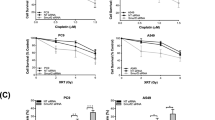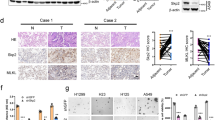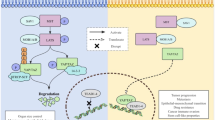Abstract
Non-small-cell lung cancer (NSCLC) represents the most frequent and therapy-refractive sub-class of lung cancer. Improving apoptosis induction in NSCLC represents a logical way forward in treating this tumor. Cisplatin, a commonly used therapeutic agent in NSCLC, induces activation of N-terminal-c-Jun kinase (JNK) that, in turn, mediates induction of apoptosis. In analysing surgical tissue samples of NSCLC, we found that expression of MKP1/CL100, a negative regulator of JNK, showed a strong nuclear staining for tumor cells, whereas, in normal bronchial epithelia, MKP1 was localized in the cytoplasm as well as in nuclei. In the NSCLC-derived cell lines H-460 and H-23, we found that MKP1 was constitutively expressed. Expressing a small-interfering RNA (siRNA) vector for MKP1 in H-460 cells resulted in a more efficient activation by cisplatin of JNK and p38 than in the parental cells, and this correlated with a 10-fold increase in sensitivity to cisplatin. A similar response was also observed in H-460 and H-23 cells when treated with the MKP1 expression inhibitor RO-31-8220. Moreover, expression of a siRNA-MKP2, an MKP1-related phosphatase, had no effect on H-460 cell viability response to cisplatin. Tumors induced by H-460 cells expressing MKP1 siRNA grew slower in nu−/nu− mice and showed more susceptibility to cisplatin than parental cells, and resulted in an impaired growth of the tumor in mice. On the other hand, overexpression of MKP1 in the H-1299 NSCLC-derived cell line resulted in further resistance to cisplatin. Overall, the results showed that inhibition of MKP1 expression contributes to a slow down in cell growth in mice and an increase of cisplatin-induced cell death in NSCLC. As such, MKP1 can be an attractive target in sensitizing cells to cisplatin to increase the effectiveness of the drug in treating NSCLC.
This is a preview of subscription content, access via your institution
Access options
Subscribe to this journal
Receive 50 print issues and online access
$259.00 per year
only $5.18 per issue
Buy this article
- Purchase on Springer Link
- Instant access to full article PDF
Prices may be subject to local taxes which are calculated during checkout











Similar content being viewed by others
References
Alpert D, Schwenger P, Han J, Vilcek J . (1999). J Biol Chem 274: 22176–22183.
Beltman J, McCormick F, Cook SJ . (1996). J Biol Chem 271: 27018–27024.
Bossy W, Bakiri I, Yaniv M . (1997). EMBO J 16: 1695–1709.
Denkert C, Schmitt WD, Berger S, Reles A, Pest S, Siegert A et al. (2002). Int J Cancer 102: 507–513.
Dérijard B, Hibi M, Wu I-H, Barret T, Su B, Deng T et al. (1994). Cell 76: 1025–1037.
Eastman A . (1985). Biochemistry 24: 5027–5032.
Ham J, Babij C, Whitfield J, Pfarr CM, Lallemand D, Yaniv M et al. (1995). Neuron 14: 927–939.
Hibi M, Lin A, Minden A, Karin M . (1993). Genes Dev 7: 2135–2148.
Hirsch DD, Stork PJ . (1997). J Biol Chem 272: 4568–4575.
Keyse SM . (1995). Biochim Biophys Acta 1265: 152–160.
Kim DH, Kim JS, Park JH, Ji YI, Kwon YM, Shim YM et al. (2003). Cancer Res 63: 6206–6211.
Kyriakis J.M, Banerjee P, Nikolakaki E, Dai T, Rubie EA, Ahmad MF et al. (1994). Nature 369: 156–160.
Levin WJ, Casey G, Ramos JC, Arboleda MJ, Reissmann PT, Slamon DJ . (1994). Chest 106(Suppl 6): 372S–376S.
Li J, Gorospe M, Hutter D, Barnes J, Keyse SM, Liu Y . (2001). Mol Cell Biol 21: 8213–8224.
Liao Q, Guo J, Kleeff J, Zimmermann A, Buchler MW, Korc M et al. (2003). Gastroenterology 124: 1830–1845.
Lim EH, Aggarwal A, Agasthian T, Wong PS, Tan C, Sim E et al. (2003). Clin Cancer Res 9: 5980–5987.
Liu Y, Gorospe M, Yang C, Holbrook NJ . (1995). J Biol Chem 270: 8377–8380.
Magi-Galluzzi C, Mishra R, Fiorentino M, Montironi R, Yao H, Capodieci P et al. (1997). Lab Invest 76: 37–51.
Mizuno R, Oya M, Shiomi T, Marumo K, Okada Y, Murai M . (2004). J Urol 172: 723–727.
Perona R, Sánchez-Pérez I . (2004). Br J Cancer 90: 573–577.
Persons DL, Yazlovitskaya EM, Cui W, Pelling JC . (1999). Clin Cancer Res 5: 1007–1014.
Sánchez-Pérez I, Martinez-Gomariz M, Willians D, Keyse SM, Perona R . (2000). Oncogene 19: 5142–5152.
Sánchez-Pérez I, Murguia JR, Perona R . (1998). Oncogene 16: 533–541.
Sánchez-Pérez I, Perona R . (1999). FEBS Lett 453: 151–158.
Slebos RJ, Rodenhuis S . (1989). Eur Respir J 2: 461–469.
Small GW, Shi YY, Edmund NA, Somasundaram S, Moore DT, Orlowski RZ . (2004). Mol Pharmacol 66: 1478–1490.
Srikanth S, Franklin CC, Duke RC, Kraft RS . (1999). Mol Cell Biochem 199: 169–178.
Standaert ML, Bandyopadhyay G, Antwi EK, Farese RV . (1999). Endocrinology 140: 2145–2151.
Vicent S, Garayoa M, Lopez-Picazo JM, Lozano MD, Toledo G, Thunnissen FB . (2004). Clin Cancer Res 10: 3639–3649.
Vivanco I, Sawyers SL . (2002). Nat Rev Cancer 2: 489–501.
Wang HY, Cheng Z, Malbon CC . (2003). Can Lett 191: 229–237.
Wiest JS, Franklin WA, Drabkin H, Gemmill R, Sidransky D, Anderson MW . (1997). J Cell Biochem Suppl 29: 64–73.
Woessmann W, Chen X, Borkhardt A . (2002). Cancer Chemother Pharmacol 50: 397–404.
Wu JJ, Bennett AM . 2005. J Biol Chem 280: 16461–16466.
Acknowledgements
We thank I Sanchez-Pérez for useful comments, JJ Sanchez for advice in statistics and F Nuñez and M Marsá for help with the studies in mice. We also thank S Keyse for providing MKP2 plasmid and E Diaz Lopez and V Torres for expert technical assistance. This work was supported by the following grants: no. 08.1/0048.1/2003 from the Comunidad Autónoma de Madrid; no. 01/1094, no. 02/0774 and no. 02/1094 from the Fondo de Investigación Sanitaria; no. RTICC C03/10 from Instituto de Salud Carlos III. The investigators RM-P and CM-G are supported by Grant no. RTICC C03/10.
Author information
Authors and Affiliations
Corresponding author
Rights and permissions
About this article
Cite this article
Chattopadhyay, S., Machado-Pinilla, R., Manguan-García, C. et al. MKP1/CL100 controls tumor growth and sensitivity to cisplatin in non-small-cell lung cancer. Oncogene 25, 3335–3345 (2006). https://doi.org/10.1038/sj.onc.1209364
Received:
Revised:
Accepted:
Published:
Issue Date:
DOI: https://doi.org/10.1038/sj.onc.1209364
Keywords
This article is cited by
-
DUSP1 Promotes Osimertinib Drug-Tolerant Persistence by Inhibiting MAPK/ERK Signaling in Non-small Cell Lung Cancer
Molecular Biotechnology (2024)
-
Dual-specificity phosphatases: therapeutic targets in cancer therapy resistance
Journal of Cancer Research and Clinical Oncology (2022)
-
Transcriptional epigenetic regulation of Fkbp1/Pax9 genes is associated with impaired sensitivity to platinum treatment in ovarian cancer
Clinical Epigenetics (2021)
-
Deubiquitinating enzyme USP33 restrains docetaxel-induced apoptosis via stabilising the phosphatase DUSP1 in prostate cancer
Cell Death & Differentiation (2020)
-
Protein tyrosine phosphatases: promising targets in pancreatic ductal adenocarcinoma
Cellular and Molecular Life Sciences (2019)



